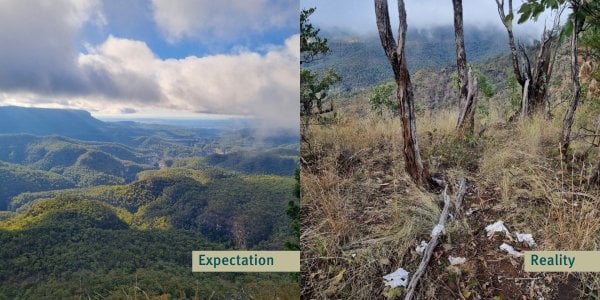Avoid a $483 nightmare this Christmas! New camping rules could cost you big time
- Replies 0
As the festive season approaches, many Australians are gearing up for their annual pilgrimage to the great outdoors.
Beaches, bushland, and camping grounds become the temporary homes for countless families and adventurers seeking to celebrate Christmas under the stars.
However, this year, campers need to be extra vigilant as new regulations could see them facing hefty fines if they don't comply with the latest environmental protection measures.
Large crowds of Australians are set to flock to beaches, walking trails, and campgrounds this holiday season, with authorities warning they will be on patrol to tackle bad behaviour and ensure people clean up after themselves.
Travellers, campers, and bushwalkers have been specifically advised to leave no trace when it comes to their waste.
Earlier this year, several popular camping sites in Queensland implemented strict new regulations banning improper ‘bush toileting’ and requiring campers to bring portable toilets for waste.

The increasing number of people defecating in the bush has ‘posed an unacceptable risk to the health and safety’ of campers and visitors, as well as ‘threatens the area's natural environment’, according to Queensland National Parks.
The penalties for non-compliance have since been raised, with rangers now also monitoring for improper rubbish disposal.
With the holiday season being a peak time for camping, the Queensland Department of Environment and Tourism has issued a stern warning: officials won't hesitate to hand out fines.
‘Our rangers will be ramping up patrols during peak holiday times to ensure people are doing the right thing by respecting the environment and each other,’ a department spokesperson stated.
Campers are urged to minimise rubbish and take all waste with them upon departure.
‘Littering is an increasingly common issue which is extremely disappointing—not to mention illegal,’ the spokesperson added.
Littering, a growing issue in recreational areas, carries an on-the-spot fine starting at $322, but it's the fines for ‘bush toileting’ that have campers most concerned.
With 15.3 million caravan and camping trips taken in 2023 and even more expected this year, the impact on the environment is significant.
In Queensland, it's mandatory for campers at Teewah Beach, Pelican Bay, and Dorrigo South within the Inskip Point Recreation Area to use an approved portable toilet.
Get caught without one, and you're looking at a $483 fine.
The government is urging campers to be well-informed about the facilities available at their chosen camping sites and to come prepared with portable toilets and waste bags.
‘Bush toileting and the unlawful dumping of human waste can harm the environment and pose an unacceptable risk to other campers, locals and other visitors,’ a government spokesperson stated.
‘We encourage campers to understand what facilities are available before packing their bags,’ they added, advising people to bring a portable toilet and waste bags in case they are needed.
‘Camping over the holidays should be fun and enjoyable for everyone. In a shared space, it is important to be mindful of those around you—this includes cleaning up after yourself, being mindful of noise levels, and being a friendly and respectful neighbour.’
As authorities ramp up enforcement of strict camping rules this holiday season, campers are being warned about potential fines for not following new waste disposal guidelines.
However, it's not just hygiene concerns on the radar. A growing trend in ‘ghost camping’—where campers book sites but either don’t show up or leave their spots unattended for over 24 hours—is also raising alarm bells.
With hefty fines for these infractions now on the table, it’s clear that the pressure is on to follow the rules and ensure a fair experience for all holidaymakers.
 Do you have any tips for eco-friendly camping or experiences with the new regulations? Share your stories and advice in the comments below, and let's help each other have a merry and green Christmas!
Do you have any tips for eco-friendly camping or experiences with the new regulations? Share your stories and advice in the comments below, and let's help each other have a merry and green Christmas!
Beaches, bushland, and camping grounds become the temporary homes for countless families and adventurers seeking to celebrate Christmas under the stars.
However, this year, campers need to be extra vigilant as new regulations could see them facing hefty fines if they don't comply with the latest environmental protection measures.
Large crowds of Australians are set to flock to beaches, walking trails, and campgrounds this holiday season, with authorities warning they will be on patrol to tackle bad behaviour and ensure people clean up after themselves.
Travellers, campers, and bushwalkers have been specifically advised to leave no trace when it comes to their waste.
Earlier this year, several popular camping sites in Queensland implemented strict new regulations banning improper ‘bush toileting’ and requiring campers to bring portable toilets for waste.

Queensland authorities are enforcing strict camping rules to combat littering and poor waste management. Credit: Queensland National Parks / Facebook
The increasing number of people defecating in the bush has ‘posed an unacceptable risk to the health and safety’ of campers and visitors, as well as ‘threatens the area's natural environment’, according to Queensland National Parks.
The penalties for non-compliance have since been raised, with rangers now also monitoring for improper rubbish disposal.
With the holiday season being a peak time for camping, the Queensland Department of Environment and Tourism has issued a stern warning: officials won't hesitate to hand out fines.
‘Our rangers will be ramping up patrols during peak holiday times to ensure people are doing the right thing by respecting the environment and each other,’ a department spokesperson stated.
Campers are urged to minimise rubbish and take all waste with them upon departure.
‘Littering is an increasingly common issue which is extremely disappointing—not to mention illegal,’ the spokesperson added.
Littering, a growing issue in recreational areas, carries an on-the-spot fine starting at $322, but it's the fines for ‘bush toileting’ that have campers most concerned.
With 15.3 million caravan and camping trips taken in 2023 and even more expected this year, the impact on the environment is significant.
In Queensland, it's mandatory for campers at Teewah Beach, Pelican Bay, and Dorrigo South within the Inskip Point Recreation Area to use an approved portable toilet.
Get caught without one, and you're looking at a $483 fine.
The government is urging campers to be well-informed about the facilities available at their chosen camping sites and to come prepared with portable toilets and waste bags.
‘Bush toileting and the unlawful dumping of human waste can harm the environment and pose an unacceptable risk to other campers, locals and other visitors,’ a government spokesperson stated.
‘We encourage campers to understand what facilities are available before packing their bags,’ they added, advising people to bring a portable toilet and waste bags in case they are needed.
‘Camping over the holidays should be fun and enjoyable for everyone. In a shared space, it is important to be mindful of those around you—this includes cleaning up after yourself, being mindful of noise levels, and being a friendly and respectful neighbour.’
As authorities ramp up enforcement of strict camping rules this holiday season, campers are being warned about potential fines for not following new waste disposal guidelines.
However, it's not just hygiene concerns on the radar. A growing trend in ‘ghost camping’—where campers book sites but either don’t show up or leave their spots unattended for over 24 hours—is also raising alarm bells.
With hefty fines for these infractions now on the table, it’s clear that the pressure is on to follow the rules and ensure a fair experience for all holidaymakers.
Key Takeaways
- Authorities in Queensland are enforcing strict new camping rules to prevent littering and poor waste management.
- Campers and bushwalkers are required to bring portable toilets for their human waste to selected camping spots.
- On-the-spot fines for littering start at $322, while fines for inadequate ‘bush toileting’ are now $483.
- Rangers are increasing patrols during holiday periods to ensure people respect the environment and comply with the regulations.







